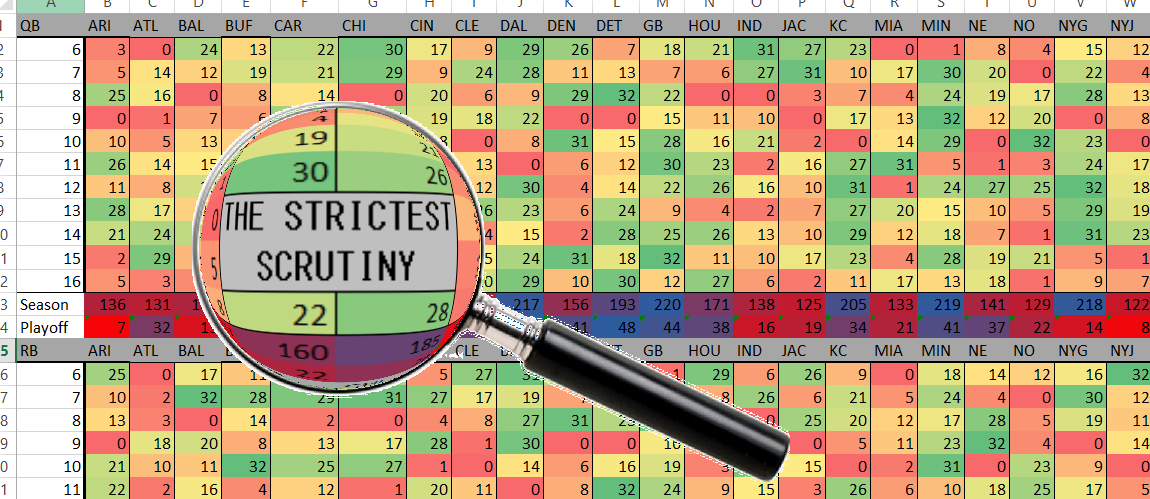“Well, go ahead and
pick up RG3. He’ll be losing the game so he’ll be throwing the ball more; more
opportunity for points.”
If you tend to go look online for fantasy football advice (I
have it on pretty good authority that you do), you’ve probably seen a comment
like this. People accept this as a reasonable statement because it sounds
reasonable. Hell, I’m sure I’ve followed advice like this in years past.
But is it true? If not, it’s worth correcting people from
this assumption.
I really don’t think it can possibly be true. Simply put,
quarterbacks who score more fantasy points are more likely to win the game.
HOW MUCH MORE DO
QUARTERBACKS THROW THE BALL WHEN LOSING?
We can probably accept that quarterbacks do throw the ball
more when losing a game – that’s basic gameplay. How much more do quarterbacks
tend to throw the ball when losing, though?
On average, a quarterback who won a game in 2013 attempted
over 32 passes, while a quarterback who lost a game attempted just under 38
passes. That’s almost a 20% difference in passes attempted – a reasonably
sizable gap, but not gigantic.
Interestingly, winning and losing quarterbacks averaged almost
the same number of completed passes.
Yes, a losing QB throws the ball significantly more than a winning QB, but
doesn’t actually complete any more passes.
Therefore, we should expect that a winning quarterback scores
more, and probably significantly more, fantasy points than a losing
quarterback. If they complete the same number of passes, both QBs have had the
same number of attempts to gain fantasy points, and the losing QB (by definition) ended
up losing the game regardless.
DO LOSING
QUARTERBACKS SCORE MORE FANTASY POINTS THAN WINNING QUARTERBACKS?
We know now that we expect this answer to be no, since
winning QBs average the same number of completed passes as a losing QB. Let’s
look at the data:
Average weekly points for winning quarterbacks: 17.8.
Average weekly points for losing quarterbacks: 12.8.
That’s a gap of almost 5 points, a larger gap than the plot
hole in Signs (seriously, most of the planet is covered in their greatest
weakness, not to mention water vapor and rain…). Clearly, the data supports the
conclusion that “you want to pick up a QB who is likely to lose” is wrong.
DO QUARTERBACKS WHO
ATTEMPT MORE PASSES NONETHELESS SCORE MORE POINTS?
Here’s where it gets confusing. So, losing QBs generally attempt
more passes than winning QBs. Losing QBs also score fewer fantasy points.
However, more fantasy points is correlated
with lots of attempted passes.
In the average game last year, a QB threw 35.3 attempted
passes.
Average fantasy points when attempting more than 35 passes:
17.1.
Average fantasy points when attempting 35 or fewer passes: 13.7.
The extremes of the data are Flacco’s 62 attempted passes in
Week 1 (18 fantasy points) and Kaepernick’s 15 passes in Week 5 against the
Texans, of which only 6 were completed (9 fantasy points).
CONCLUSION
You do want a QB who is throwing a lot, but you want one who
will ultimately win the game while throwing a lot. The basic rationale that “throwing
more means more QB points” makes sense, and is supported by the data. The next
logical step that people take – that losing QBs throw more – is also true.
However, all increases in attempted passes are not equal – if a QB loses, the increased
attempted passes aren’t scoring many points.
Therefore, you do not want a QB who loses the game on your
fantasy team, though the rest of the underlying logic is valid.
It should come as no surprise that you’d generally rather
have a winning QB than a losing QB on your fantasy team, all else being equal. When
you see someone claim that they’d rather have a losing QB than a winning QB, do
them a favor and show them this analysis.
Thanks to pro-football-reference.com for having excellent
and easily-accessible stats.
-The Strictest Scrutiny, where everything is analyzed except
for whether Jamaal Charles is more man than machine.






